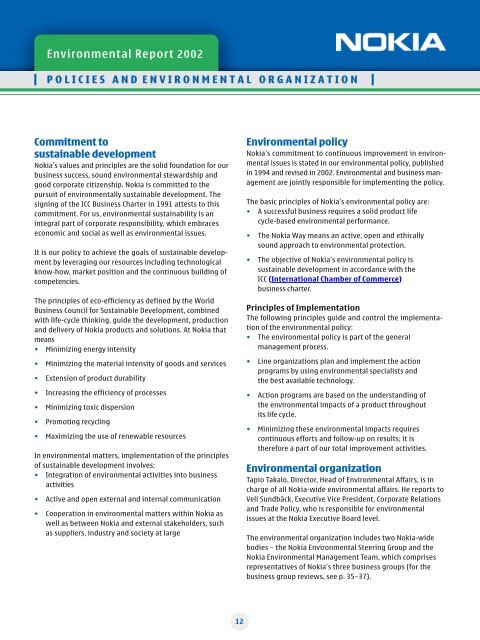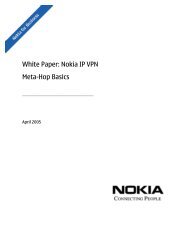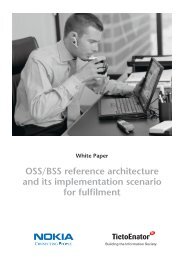Nokia Environmental Report 2002
Nokia Environmental Report 2002
Nokia Environmental Report 2002
Create successful ePaper yourself
Turn your PDF publications into a flip-book with our unique Google optimized e-Paper software.
<strong>Environmental</strong> <strong>Report</strong> <strong>2002</strong><br />
P O L I C I E S A N D E N V I R O N M E N T A L O R G A N I Z A T I O N<br />
Commitment to<br />
sustainable development<br />
<strong>Nokia</strong>’s values and principles are the solid foundation for our<br />
business success, sound environmental stewardship and<br />
good corporate citizenship. <strong>Nokia</strong> is committed to the<br />
pursuit of environmentally sustainable development. The<br />
signing of the ICC Business Charter in 1991 attests to this<br />
commitment. For us, environmental sustainability is an<br />
integral part of corporate responsibility, which embraces<br />
economic and social as well as environmental issues.<br />
It is our policy to achieve the goals of sustainable development<br />
by leveraging our resources including technological<br />
know-how, market position and the continuous building of<br />
competencies.<br />
The principles of eco-efficiency as defined by the World<br />
Business Council for Sustainable Development, combined<br />
with life-cycle thinking, guide the development, production<br />
and delivery of <strong>Nokia</strong> products and solutions. At <strong>Nokia</strong> that<br />
means<br />
• Minimizing energy intensity<br />
• Minimizing the material intensity of goods and services<br />
• Extension of product durability<br />
• Increasing the efficiency of processes<br />
• Minimizing toxic dispersion<br />
• Promoting recycling<br />
• Maximizing the use of renewable resources<br />
In environmental matters, implementation of the principles<br />
of sustainable development involves:<br />
• Integration of environmental activities into business<br />
activities<br />
• Active and open external and internal communication<br />
• Cooperation in environmental matters within <strong>Nokia</strong> as<br />
well as between <strong>Nokia</strong> and external stakeholders, such<br />
as suppliers, industry and society at large<br />
12<br />
<strong>Environmental</strong> policy<br />
<strong>Nokia</strong>’s commitment to continuous improvement in environmental<br />
issues is stated in our environmental policy, published<br />
in 1994 and revised in <strong>2002</strong>. <strong>Environmental</strong> and business man-<br />
agement are jointly responsible for implementing the policy.<br />
The basic principles of <strong>Nokia</strong>’s environmental policy are:<br />
• A successful business requires a solid product life<br />
cycle-based environmental performance.<br />
• The <strong>Nokia</strong> Way means an active, open and ethically<br />
sound approach to environmental protection.<br />
• The objective of <strong>Nokia</strong>’s environmental policy is<br />
sustainable development in accordance with the<br />
ICC ( International Chamber of Commerce )<br />
business charter.<br />
Principles of Implementation<br />
The following principles guide and control the implementation<br />
of the environmental policy:<br />
• The environmental policy is part of the general<br />
management process.<br />
• Line organizations plan and implement the action<br />
programs by using environmental specialists and<br />
the best available technology.<br />
• Action programs are based on the understanding of<br />
the environmental impacts of a product throughout<br />
its life cycle.<br />
• Minimizing these environmental impacts requires<br />
continuous efforts and follow-up on results; it is<br />
therefore a part of our total improvement activities.<br />
<strong>Environmental</strong> organization<br />
Tapio Takalo, Director, Head of <strong>Environmental</strong> Affairs, is in<br />
charge of all <strong>Nokia</strong>-wide environmental affairs. He reports to<br />
Veli Sundbäck, Executive Vice President, Corporate Relations<br />
and Trade Policy, who is responsible for environmental<br />
issues at the <strong>Nokia</strong> Executive Board level.<br />
The environmental organization includes two <strong>Nokia</strong>-wide<br />
bodies – the <strong>Nokia</strong> <strong>Environmental</strong> Steering Group and the<br />
<strong>Nokia</strong> <strong>Environmental</strong> Management Team, which comprises<br />
representatives of <strong>Nokia</strong>’s three business groups (for the<br />
business group reviews, see p. 35–37).

















